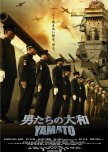
Tonally messy but otherwise great
While the main body of its story is at tonal odds with its framing device, Junya Satō's Yamato is an impressively made, often brutal exploration into the lives of those aboard Japan's most iconic warship during her final days at sea. Yamato oddly decides to use the Titanic and Saving Private Ryan storytelling formula, which is where this tonal contradiction stems from, it's at heart an anti-war film but the framing device dangerously treads the line of propaganda mode (the song at the end almost tipped it over the edge). However, Yamato manages to sail on unopposed, opening up discussion and criticism of such reckless leadership that led to such an abhorrent waste of life, a suicidal last defence. Satō's clean direction helps to highlight the outstanding production design, most of the budget having been spent on painstakingly recreating part of the titular ship on a 1:1 scale, the two complement each other exceptionally well. Joe Hisaishi's music isn't as memorable as some of his other efforts, it often feels like he's emulating a Hans Zimmer score, but it's an effective soundtrack nonetheless. Backed by great performances and a stunningly realised final battle, Yamato strategically uses the ruptures of trauma in an attempt to erase any inconsistencies, all the while reassuring its shocked audiences with a familiar, if conventional, film style.Was this review helpful to you?

All style
Gakuryû Ishii's Shuffle is mostly just a short exercise in style if nothing else. Often extremely hectic and practically headache-inducing, it lacks any form of narrative or characterisation, Shuffle instead concentrates on two intercutting and unfocused subplots that ultimately amount to very little. Adapted from the legendary Katsuhiro Otomo's short manga, Run, although Ishii never actually asked for permission until after the film had been shot, go figure. Granted, the exhaustingly long chase through the Japanese streets which make up the majority of the film is shot in wild, semi-abstract patterns so that you're never quite sure what you're seeing and backed by a repetitive if memorable industrial synth score. You can certainly feel the influence Ishii's punk stylings would have on more modern Japanese cinema but I just wish there was a bit more meat on Shuffle's bones to really make me fall in love with its underground grim.Was this review helpful to you?
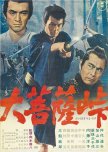
A paradoxical relationship
A painfully slow yet exceptionally captivating tale of a man who chooses to devote his life to evil and the madness that follows, The Sword of Doom is more often than not defined by its meticulously precise construction. Serving as the first part of an unfinished trilogy adapting the famously incomplete Great Bodhisattva Pass, The Sword of Doom was thrust upon Kihachi Okamoto by Toho, due to them being dissatisfied with his previous film. Here, Okamoto not only delivers a grand, sweeping epic crammed with beautiful shots and exceptional staging but also marks it out as an expression of rage, conditioning and stylish tension. Although I found the pacing glacially slow in comparison to his other works, it's Tatsuya Nakadai's stunning performance that incarnates perfectly the paradox at the heart of his character which makes for such engaging viewing that it wasn't a huge deal breaker for me. Clean yet brutal, The Sword of Doom makes for a remarkably vicious gesture of destructive essence, with unmistakable visual beauty inseparable from horror.Was this review helpful to you?
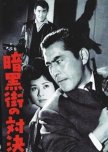
A Toho take on the Nikkatsu crime drama
The Last Gunfight benefits from being helmed by the immensely talented Kihachi Okamoto and his odd sense of humour. From Toshirō Mifune's fast-talking, no-nonsense, bitch slapping detective to mariachi-looking yakuza killers who sing at gentlemen's clubs in their off time, the film has an ample sense of style complete with a heavy jazz-infused score by Masaru Satō. While the film certainly has issues with its pacing and otherwise predictable story; the use of old film noir sensibilities, lovely use of colour and dynamic quick-cut action that marries with the more heavy cross-cutting editing, ultimately means that The Last Gunfight will more than satisfy many Okamoto fans looking for something a little bit different and a hell of lot more camp.Was this review helpful to you?

They don't call me kamikaze for nothing!
With Star Wars marking a turning point in cinematic blockbusters, it's only natural it would spawn countless imitators and knock-offs. I've taken a look at Toho's answer with The War in Space before and I thought it high time to take a look at Toei's attempt. Often unfairly slagged as a cheap rip-off of the previous year's Star Wars, Message from Space actually has way more going for it than what initially meets the eye.The peaceful planet of Jillucia has been nearly wiped out by the Gavanas, whose leader takes orders from his mother rather than the Emperor. King Kaiba sends out eight Liabe holy seeds, each to be received by a chosen one to defend the Gavanas. Each recipient, ranging from hardened General Garuda to Gavana Prince Hans to young Terrans Meia, Kido, and Aaron all have different reactions to being chosen.
Considering how much George Lucas lifted from Japanese culture and cinema for Star Wars, consider Message from Space a case of, ahem, striking back. In a narrative sense, the story is completely baffling and at times indecipherable, taking the core elements that makeup Star Wars' story but delivering it in a way that a viewer is left in a state of confusion. A white-clad princess on the run, an evil empire, armoured bad guy troopers, an obnoxious beeping droid, a trench run, a cantina, and spaceships flying in formation. There’s even a long shot of an enemy starship cruising into the frame. And while Darth Vader may have drawn visual inspiration from samurai, Message from Space has full-on space samurai as the villains.
Where this film shines, and boy it does shine, is in its incredible visual and production design. Given this was the most expensive Japanese film at the time, and yet was made for half the budget of Star Wars, it looks mighty impressive. Be it the gorgeous, elaborate sets and costumes or the highly detailed and genuinely incredible and increasingly complex miniature special effects work by Nobuo Yajima, the ethereal and dreamlike fantasy nature of the film is present from the encapsulating opening titles. The very literal "spaceships" are a real work of art and wouldn't be out of place from a Gerry Anderson production.
Given my love for Kinji Fukasaku's final film, Battle Royale, it's no wonder that I would love this as well. With the sweeping and evocative landscape shots, the gritty and intense yet easy-to-follow fight sequences, the expert choice of shots and thanks to regular collaborator Tôru Nakajima the film isn't without a bold use of colour from brilliant orange to deep blues, its most certainly a visual treat for the eyes.
The film's cast is populated by many faces you may recognise, be it the always reliable Vic Morrow or Sonny Chiba to a baby-faced Hiroyuki Sanada. There are hardly any complaints to be had on the talent front and they all perform the film well even if what is being delivered is a bit too much at times. The music by Ken-Ichiro Morioka is pretty good, there's plenty to love in its more fantastical elements and less synth-laden than you'd expect but it matches the visuals well and does a good job, lends itself to easy listening so maybe I'll give it another listen one day.
Overall, Message from Space is a very bold attempt at the Star Wars formula and makes up for its shortcomings with devil-may-care energy reminiscent of '40s-era serials. The Blu-ray set I bought comes with both the English version of the film, the spin-off show Galatic Wars and the compilation movie of that show, so I'm hardly done with Message from Space for a while yet.
Was this review helpful to you?
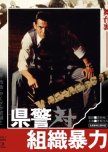
The title says it all
Even at the height of his popularity, Kinji Fukasaku never forgot what put him there in the first place, he can populate a frame like no one else and tackle an unflinching view of society with lines unclear and blurry. Cops vs. Thugs doesn't need a summary, its summary is its title. In Fukasaku's world, there's no honour among thieves or lawmen alike and the only thing that matters is personal honour and duty between friends. It plays like some of the great crime films of Sidney Lumet and Jean-Pierre Melville but with the fabulous additions of Kazuo Kasahara's shattering screenplay and Fukasaku's dynamic dedication to supporting an all-star ensemble cast of likeable undesirables with Bunta Sugawara once again leading from the front.Was this review helpful to you?

Goofy fun
Android Kikaider is another semi-run-of-the-mill 70s tokusatsu show from Shōtarō Ishinomori, the same mind who brought us the likes of Kamen Rider. While for the most part very monster of the week like early Shōwa era Ultraman episodes, it's in the last 7 episodes where it becomes exceptional as that is the introduction of Hakaider and where the show becomes worthy of its reputation. It's got its dated elements and isn't nearly as great in terms of production as some of Toei's other productions from that era, but it remains a solid show regardless. Also, shout out to Daisuke Ban who carries much of this show as the titular character.Was this review helpful to you?
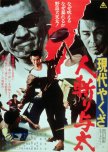
Humble beginnings
Playing like a prototype to his later Battles Without Honor and Humanity series, Steet Mobster is a pivotal work in the yakuza movie genre and the career of director Kinji Fukasaku. Portraying an abrasive portrait of the rise and fall of a reckless street punk caught in the crossfire of a bloody turf war raging in the mean streets of Kawazaki, Bunta Sugawara's utterly unhinged performance combined with Fukasaku's incredible camera work makes this chaotic and disturbingly vile tale truly come to life.Was this review helpful to you?
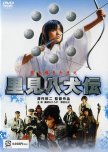
Fukasaku does Kurosawa
Although he's well-defined by his slew of Yakuza films, it's easy to forget that Kinji Fukasaku had an experimental phase like many others and Legend of the Eight Samurai came at the height of that phase. A bold fantasy epic, taking cues from Kurosawa's samurai movies, it mixes classical imagery with the stuff of nightmares, martial arts, beautiful music, giant bug monsters, Fukasaku's hyper-kinetic camera work and potency for bloody violence into a movie about friendship, good vs evil and a woman's quest for identity in not being defined by her lineage.Was this review helpful to you?

A forumla perfected
Even with its sombre and bleak tone that puts many of his other works to shame, once the smoke clears, there are more than enough corpses to fill this graveyard. Yakuza Graveyard is one of Kinji Fukasaku's more psychological approaches to his Yakuza films, dripping with nihilism and crammed full of energy, the film has all the hallmarks of Fukasaku's other movies. Here, he chooses to focus on the complicated and damaged psyche of Tetsuya Watari's investigator Kuroiwa with the chemistry he shares with Meiko Kaji's Keiko adding some beautiful tenderness to this gripping tale of violence and interpersonal deception. The camera tilts, dives and chases after the exceptional action, at no point becoming lost in the haze of bloody knuckles and muzzle flashes; combining this with Toshiaki Tsushima's prog rock style score and Yakuza Graveyard remains just as emotional, hard-hitting and badass as Fukasaku's other works, maintaining a standard of quality few could rival.Was this review helpful to you?

Less action than expected, more courtroom drama
The Great War of Archimedes is Takashi Yamazaki's second stab at similar themes he would later refine further in the glorious Godzilla Minus One, yet he handles said themes in a way more cynical approach than what we saw with the Big Lizard. With The Great War of Archimedes, Yamazaki explores all the political and personal ramifications of building what would become the Yamato would cause Japan, inevitable war. In a way, it feels extremely derivative of Yamazaki's earlier The Eternal Zero, acting as a self-aware commentary on Japan's militarism and contemporary national ethos. Much of the film is a courtroom drama, but Yamazaki does manage to sneak in a lot of fabulously executed action, he's one of the best Japanese filmmakers when it comes to utilising CGI to augment his set pieces. Combine this with some stirring performances from its cast and a gorgeous score by Naoki Satō leaves The Great War of Archimedes as another underseen gem in Yamazaki's extensive filmography.Was this review helpful to you?
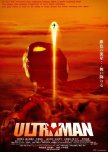
A fine jumping on point for the uninitiated
What I appreciate about Ultraman is that it has so many great jumping-on points for people looking to get into the series; although The Next is one of the weaker starts I've seen, it is a noble attempt to update the formula with a much more adult tone. Particularly considering this was Tsuburaya's big attempt to revitalise the character after the problematic circumstances surrounding the broadcast of Cosmos. It's a more than welcome reimagining.There's some lovely direction by series veteran Kazuya Konaka, particularly in its Top Gun-inspired opening. Great character work and performances, especially from Tetsuya Bessho and Kenya Ousumi, plus a banging soundtrack from rock artist Tak Matsumoto who provides brilliant updates to the classic themes. I do like Ultraman's new design despite it being a bit out there due to how radically different it is from the original but the updated Bemular is a truly frightening creation and more than worthy of praise.
Where I'm not particularly sold is the rather iffy use of CGI, especially considering how good the model work and suitmation are, and the cheesy dialogue at points that feels like it's trying to appeal to kids despite the tone of the movie is very much skewed towards adults with some pretty horrifying imagery to boot.
Regardless, The Next captures the heart of what makes Ultraman, well, Ultraman. His relentless pursuit of providing hope for humanity in the face of its destruction; while mixing in with the inner turmoil of its host who has more than his fair share of skin in the game. It offers up some extremely entertaining and well-executed monster fights and hits the right stride for those wanting a slightly more mature tone for the series. It's just a shame that the Ultra N Project failed because what we got here is a great basis for a newer take on the character.
Was this review helpful to you?
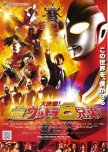
Open your eyes to the unbelievable
The Multiverse of Madness we deserved. The way this movie is so unapologetic in its portrayal of hope out of hopelessness from its cast of characters is simply beautiful, I can't help but love it unconditionally.On July 17, 1966, best friends Daigo Madoka, Shin Asuka, and Gamu Takayama watch the first broadcast Ultraman television series at Daigo's house. They are inspired to grow up and do great things. 30 years later, the three have forgotten their childhood passion for Ultraman and dreams while continuing their lives as normal civilians. With aliens threatening the utter annihilation of Earth and Daigo experiencing mysterious visions, Ultraman may just provide the key to saving the entirety of mankind.
It does feel odd that despite Ultraman Mebius and Mirai Hibino being the then-current Ultra brother and host on TV at the time, the film instead opts to tell the events from the point of view of Daigo Madoka, the human host for Ultraman Tiga. I'm not complaining mind you. It's great to see what is currently Hiroshi Nagano's final appearance in the franchise and he does so with true style and an unshakeable charm. The first four Ultraman protagonists return in maturer mentor roles yet still get to do the job they started all those years ago, seriously Susumu Kurobe, Kohji Moritsugu, Jiro Dan and Keiji Takamine are all excellent in and out of the suits. It's just a treat for the long-time fans and a beautiful cap-off for the TDG trio.
This was until recently the highest-grossing entry of the entire Ultra franchise, being overtaken by Shin Ultraman very quickly. You can see why this film made the money it did, combining a love for both the Showa and Heisei eras and showcasing the best of both worlds. I have to hand it to director Takeshi Yagi, a Heisei Ultra veteran, for crafting this film in such an exquisite way, the direction, compositing and set pieces are all top-notch and cleanly executed to the highest standards, the CGI work especially which is usually a low point for these productions looks divine. The suitmation work is just consistently beautiful but the final act is where it all comes together seeing all of the Ultra brothers fighting side by side onscreen with some seriously tense emotional stakes just hits the nail on the head.
I take my hat off most of all to writer Keiichi Hasegawa, whose name I'm more than familiar with; penning the likes of GMK, the first two Heisei Gamera films, SSSS.Gridman and numerous episodes of other Ultra shows, including my beloved Tiga. What he has crafted here however is perhaps one of his finest works. The dialogue oozes charm and sophistication in a way that only Tokusatsu can deliver, the right balance of cheesy and serious, hope and cynicism, nostalgic connections and undying charm. There wasn't a moment that went by where I didn't have a smile on my face, it's the type of fan service and nostalgia done right, not for the sake of it being there but for delivering a movie that utilises them to great effect and analyses why we have such affection for them.
The movie deconstructs the character's admiration for the ideal of hope rooted in their consumption of fantasy entertainment. How the nostalgia we have for the content we consume at a younger age has the ability to inspire us and hold us back when we are older. How our perception of the world is warped by the fantasy we desire in the world. The fantasy that we continue to search for in the world to help guide us. Doing so causes one to forget about the lessons of consistency through perseverance as a means of remembrance. Remembering what inspired an individual to develop their current meaningful connections.
The music by Toshihiko Sahashi fits the tone of the movie perfectly. Another veteran of the franchise but not without his other merits, composing for Toei's Kamen Rider series as well as the Gundam franchise. His style of composition is richly symphonic and classical with the occasional use of jazz, it plays off older themes of the series but restrains using them in their entirety outright. Sort of like how Bill Conti composed the music for For Your Eyes Only in a way. The keyboard-heavy symphonic score just fits so well with the sense of hope this movie brings.
42 years' worth of world-building leads to one of the most heartfelt love letters to a series you could ever ask for. Even for a relative Ultra series novice like myself, you can really feel the love and passion for this series throughout the movie, never relenting and never giving up its hope for the future. Old friends and foes get new and fresh redesigns that give the kaiju a huge air of menace, with the old Ultramen having never looked so good.
Overall, Great Decisive Battle! The Super 8 Ultra Brothers is a full love letter to the series that encapsulates what Ultraman represents as a whole. It reinforces the power of faith and dreams in a way that's totally unlike any film I've seen in a while. I love it to pieces.
Was this review helpful to you?

A perfect extended ending
The Final Odyssey could have very easily screwed up what is already a perfect ending to a series, but this bridge between the outgoing Tiga and incoming Dyna packs the same emotional core and incredible storytelling that made Tiga one of the best Ultra shows, to begin with.Two years after the events of 'Ultraman Tiga', Daigo is forced to pick up another Dark Spark Lens in an attempt to stop three evils the once, dark Tiga worked with 30 million years ago, to stop destruction in Japan once and for all.
Everything about The Final Odyssey is bigger, badder and sleeker; the elongated runtime and larger budget that is afforded thanks to this being a feature-length movie mean everything is to the highest standard, top-notch in its design and execution. The widescreen presentation allows for an impressive variation of shots and set pieces, director Hirochika Muraishi outdid himself with this. It's gorgeous to look at through and through. The underwater fight between Tiga and Darramb is incredible but only equally matched by the final showdown against Camearra (I'll get to her in a moment) and the suitmation is very clean although I'm not majorly fond of the digital effects used to transform Camearra into darkness at the very end.
Seeing how much our cast has changed since the finale of Tiga, the relationship and impending wedding of Daigo and Rena make for a great personal motivation for the duo. Daigo's hesitation and self-doubt manifest in his desire to save the world one more time with Rena supporting and trusting him nearly every step of the way. Their decision to take up arms again is met with this gorgeous little sequence of minimal dialogue accompanied by an excellent musical score and dynamic camera. The chemistry between Hiroshi Nagano and Takami Yoshimoto is on full display here and you are totally engrossed in their story. The rest of the GUTS squad are all on fine form even if they aren't the starring party this time around but does serve as an equally nice introduction to the eventual successors making a big splash near the end.
With all the strength in its character writing, it's the film's villains that bring a fresh perspective to The Final Odyssey. We've seen Evil Tiga in the TV show and although he was only limited to the second half of a two-parter, Three ultimately evil Ultra's make the impact needed to give the film a world-ending and indeed universe-ending threat. Camearra, Darramb, and Hudra are all equally memorable for a multitude of reasons, but it's with Camearra where the real antagonist lies. Tiga's former lover from a bygone era, all the credit goes to actress Miyoko Yoshimoto for carrying that amount of sass and power into her suit performance as well. Catch me simping for her on an off day.
The excellent musical score from Tiga is carried over and Tatsumi Yano provides some equally beautiful new material as well as some repurposed older material from the show. Opening with Brave Love Tiga was an inspired choice accompanying the montage of notable moments from the TV show before beautifully transitioning into the film. Of course, the use of Take Me Higher is relegated to the end credits but as it always does, it makes an impact.
Overall, Ultraman Tiga: The Final Odyssey is a beautiful epilogue to Tiga as a whole, it sends our beloved characters off with gorgeous style.
Was this review helpful to you?
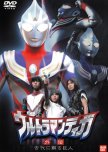
Ultraman Tiga Gaiden: Revival of the Ancient Giant
0 people found this review helpful
More like a DVD extra
Here's the thing about Ultraman Tiga Gaiden: Revival of the Ancient Giant, while it may be somewhat unremarkable as a little side venture and as an extension of the Ultraman Tiga story, the idea of setting a giant hero story in Stone Age Japan is an inspired one and an idea I could easily see being fleshed out again someday.Five thousand years ago, an ancient red-and-blue warrior of light defended a village against a giant, golem-like monster, but disappeared after that, where the Ultra is worshipped by superstitious locals as a guardian protector. In the present time of 2038, Super GUTS pilot Tsubasa Madoka (son of Daigo and Reina Madoka) pursues the monster Jomonoid, before suddenly getting dragged into a wormhole. Upon arrival, Tsubasa realized he's stuck centuries in the past, specifically, in the same village that Ultraman Tiga once guarded, and there are evil forces who want to prevent the re-awakening of Ultraman Tiga while re-summoning monsters of the past...
The original plan for Gaiden had been for Hiroshi Nagano to return as Daigo, but unfortunately, due to scheduling conflicts with his band V6's then-ongoing tour, he was unable to participate in the production. Thus, Daigo and Rena's son, Tsubasa Madoka, was created in his place. This isn't as major of a complaint as I'd initially thought because the new cast of characters is quite good fun, especially given the premise and setting with Tsubasa being quite a fun little protagonist even if he goes on a pretty similar journey to Daigo in learn to come to terms with co-existing as both himself and as Tiga.
There's a lot of lavish direction in this story thanks to the efforts of frequent Tiga, Dyna and Gaia director Hirochika Muraishi, who also helmed my beloved Final Odyssey. He makes great use of the larger budget the effects team were afforded and puts them to work with some stunning destruction sequences, the Kaiju vs Ultra fights are well staged, but there's the odd bit of front projection and CG that like most of the early Heisei Ultra shows hasn't aged very well.
The cast of Gaiden is all made up of returning actors from the entire TDG trilogy aside from Hiroshi Nagano and Takami Yoshimoto doesn't return as Rena either despite Letterboxd crediting both of them for some reason. Shôgo Yamaguchi is quite a fun protagonist in the form of Tsubasa and Yuri Yamazaki portrays a great badass in the form of the warrior Mahoroba, but I cannot get behind Makoto Kamijo as Amui who is borderline insufferable at times and pretty much robs Tsubasa of his heroic moments.
Tatsumi Yano retains much of the classic pieces from his Ultraman Tiga score and they all do their job just as well as they did in the TV show. Perhaps my biggest criticism is that both Take Me Higher and Brave Love Tiga are nowhere to be seen in Gaiden. Instead, Kodou~for TIGA~ is the theme and I'm honestly not a fan, it's one of the weaker songs that's been used to signify Tiga as a character.
Overall, Ultraman Tiga Gaiden: Revival of the Ancient Giant is ultimately little more than an extended episode of the TV show but its production more than carries it despite it feeling quite disheartening to not have the original cast in it. It's closer to an exciting DVD extra more so than a film.
Was this review helpful to you?





